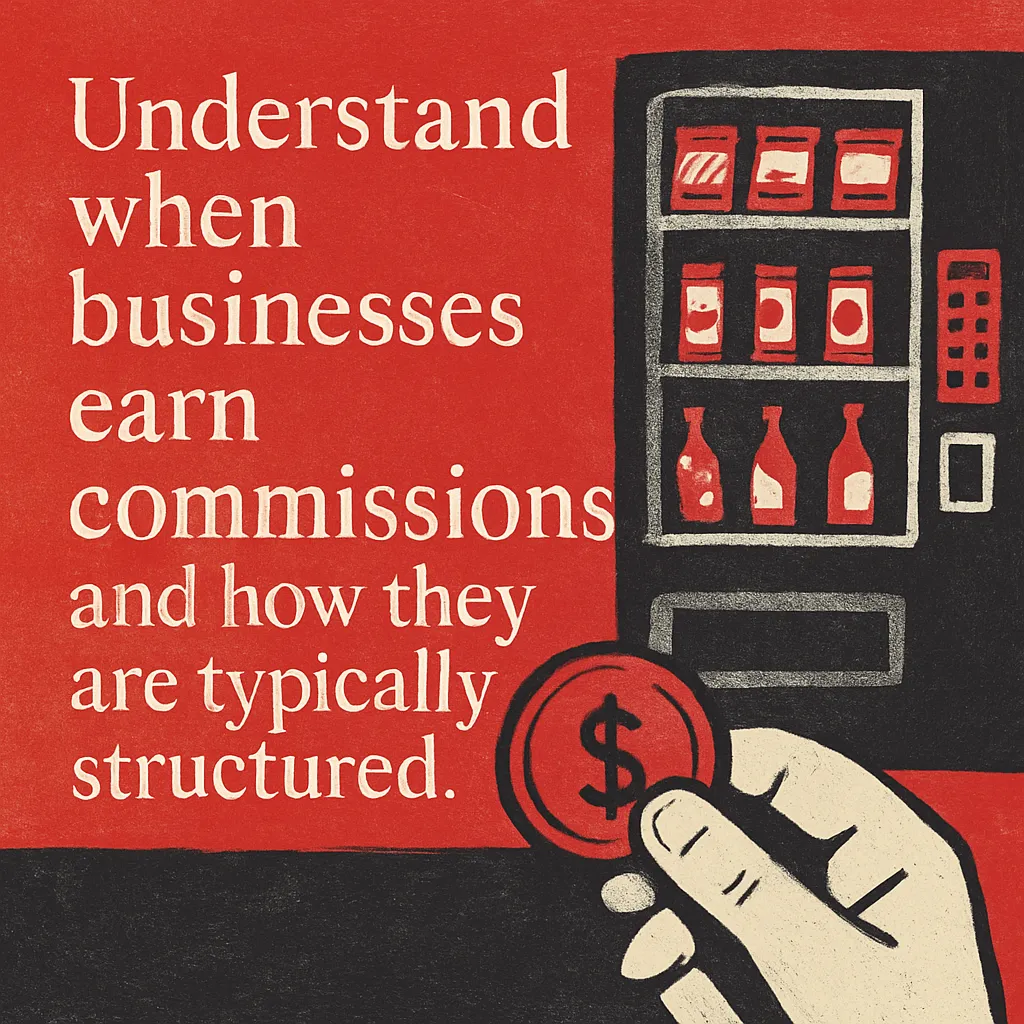Are There Commissions from Vending Machines?
Understand when businesses earn commissions and how they are typically structured.
Back to Vending FAQs ResourcesUnderstand when businesses earn commissions and how they are typically structured.
Back to Vending FAQs ResourcesMany businesses choose to host vending machines as a no-cost amenity that can also generate passive income. This income often comes in the form of commissions, which are a share of the sales revenue.
![]() Generate passive income with minimal effort
Generate passive income with minimal effort
![]() Enhance employee or customer convenience
Enhance employee or customer convenience
![]() Negotiate favorable commission rates based on location potential
Negotiate favorable commission rates based on location potential

For many businesses, hosting a vending machine isn't just about providing convenience; it's also about generating additional revenue. Commissions—a percentage of the sales from the vending machine—are a common way for sites to earn passive income. These commissions are often negotiated as part of a comprehensive service agreement, which outlines everything from restocking schedules to machine maintenance. Understanding how these payment structures work is crucial for any business considering adding vending solutions.
Vending machine commissions are typically calculated as a percentage of the gross sales generated by the machine on your premises. This percentage can vary significantly, usually ranging from 5% to 25%, but sometimes even higher for prime locations. The exact rate depends on several factors, including the expected sales volume, the type of products offered, and the nature of the location. For example, a high-traffic office building or a busy entertainment venue might command a higher commission rate due to the greater earning potential. Businesses should also be aware of the importance of clear agreements, as highlighted in "Vending Contracts for Hospitals."
When you decide to install a vending machine, the commission rate is one of the key terms you'll negotiate with the vending provider. Factors that can strengthen your negotiation position include high foot traffic, extended operating hours, and a demonstrated need for convenient refreshments from your employees or customers. It's important to discuss transparency in sales reporting to ensure accurate commission payments. Being informed about how to negotiate a vending contract can help secure more favorable terms.
While commissions are prevalent, it's worth noting other models exist. Some businesses might opt for a fixed monthly rental fee per machine, especially if sales volume is highly unpredictable or if amenities are prioritized over revenue generation. Alternatively, some businesses, particularly those with very high traffic, might explore owning and operating their own machines, thereby keeping 100% of the revenue, though this comes with added operational responsibilities. For locations with significant space and high demand, options like micro markets—which offer a wider range of products and usually higher sales volumes—often involve a similar commission structure with potentially greater revenue for the location owner. You can learn more about this by reading "Micro Market vs Vending Machines." Larger facilities or those with specific needs, might also integrate vending solutions with broader programs, as detailed in revenue sharing from vending in public buildings.
Ultimately, whether you earn commissions from vending machines largely depends on the agreement you strike with your vending provider and the specific characteristics of your location. Ensuring clear terms and understanding the potential revenue streams can make vending a valuable addition to your business operations.
A vending machine commission is a percentage of the gross sales (or a fixed rental fee) that the vending machine operator pays to the location owner for the privilege of having their machine on site.
Commissions are usually calculated as a percentage of the total revenue generated by the machine(s) at a given location. Some agreements might involve a fixed monthly rent per machine.
Factors include foot traffic, sales volume potential, type of products sold, machine placement, and whether the location is public or private. High-traffic areas often command higher commission rates.
Yes, some locations might receive free vending services or a low commission if the sales volume is low, or if the primary benefit is seen as an amenity for employees or customers rather than a revenue generator.
The vending machine operator (or company that owns/manages the machines) pays the commission to the business or property owner where the machine is located.
Absolutely. Commission rates are often negotiable, especially for attractive locations with high foot traffic or for businesses willing to sign longer-term contracts.
While a higher percentage sounds good, it's essential to consider gross sales. A lower commission on higher sales might generate more revenue than a high commission on low sales.
Micro markets typically operate on a similar commission structure to vending machines, with the location owner receiving a percentage of sales. However, the profit potential for owners can often be higher due to increased product variety and sales volume.
Typical commission rates can range from 5% to 25% of gross sales, though this can vary significantly based on the industry, location, and negotiation.
Higher commission demands can sometimes lead operators to slightly increase product prices to maintain their profit margins, which ultimately impacts the consumer.